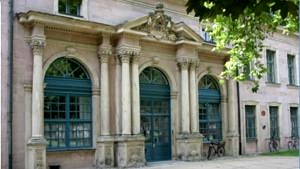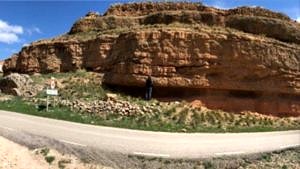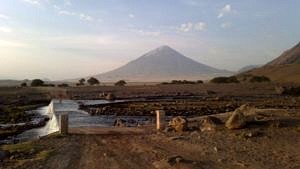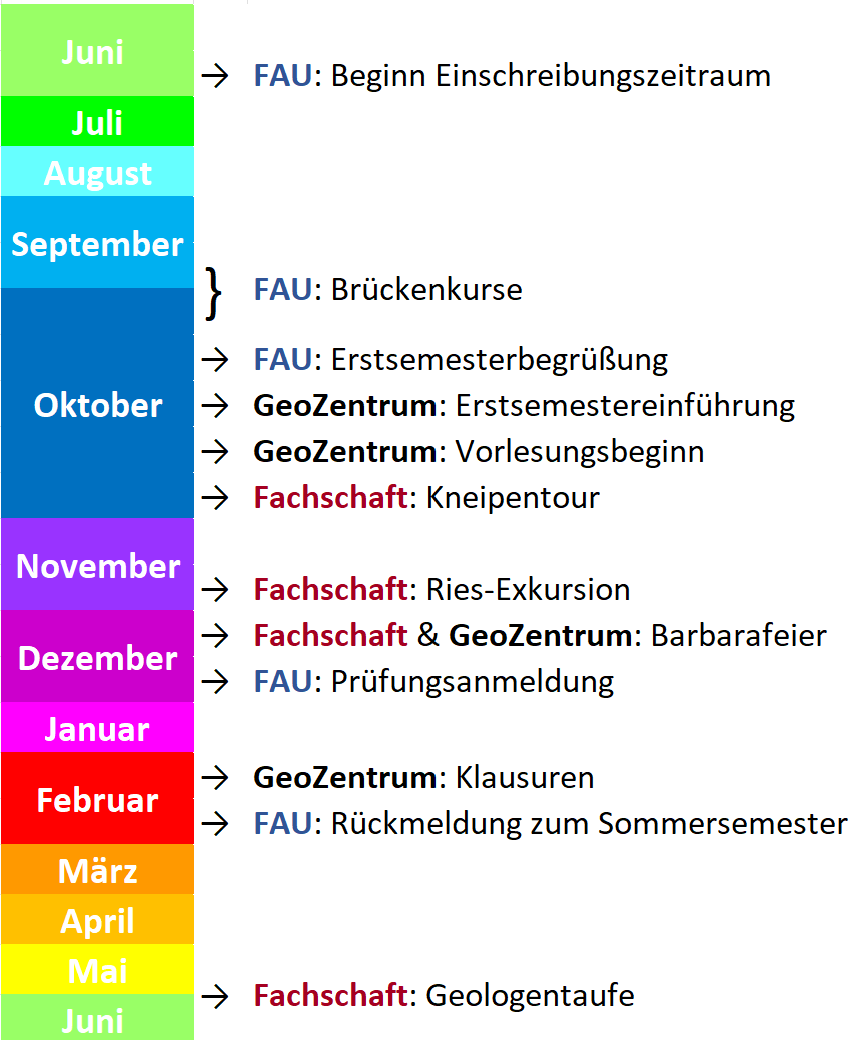Prospective Students
Geoscience in Erlangen
Together with our students, we research the Earth system for the challenges of the future.
- Causes and consequences of climate change
- Securing and sustainable use of resources
- Development and optimisation of materials
- Geodynamics and evolution
Geoscientists research the interrelationships and interactions of the “System Earth”, the geosphere, hydrosphere, biosphere and atmosphere. They deal with the structure and evolution of the earth and its habitats. The results of geoscientific research are of great importance, e.g. for protection against natural disasters or for the sustainable use of our finite resources. Geosciences are therefore essential in a society for which sustainable management is important in order to preserve our earth for future generations.
- How does our earth work? As a geoscientist, you explore our planet, its complex history of formation and learn to understand processes in and on it.
- Geoscientists sit at the intersection of all the natural sciences and combine them to unravel the mysteries of the Earth.
- You can work to protect people from natural disasters ranging from rock slides to tsunamis.
- As a geoscientist, you can help meet our resource needs, from water to rare earths for smartphones, and lead us towards sustainability.
- Or you can work on the causes and effects of climate change and contribute to climate protection with alternative geo-energy sources.
- There are many job opportunities for geoscientists both within and outside the geosciences. In addition, there are many exciting opportunities to further your own education after studying geosciences in the department.
- Excursions are unique! You will experience geosciences live in numerous excursions at home and abroad and apply the knowledge you have learned in the lecture hall in the field.
- The small course sizes in Erlangen and the intensive supervision on excursions offer a very good supervision ratio and proximity to research and industrial projects.
- A wide range of options in the fields of study, elective modules and key qualifications offers you many possibilities to tailor your studies to your individual interests.
- Short distances, many recreational opportunities, city and nature within easy reach, a wide range of cultural activities, many FSI events – Erlangen and the metropolitan region offer you a high quality of life.
In the Bachelor’s degree programme in Geosciences, you will gain a basic understanding of geological processes and interrelationships. You will get to know various geoscientific methods and then apply them practically in the course of your first scientific work – the Bachelor’s thesis. The Erlanger Geosciences are also known for our already national and international excursion programme. In addition to the geoscientific subjects, you will also receive a broad scientific education as a basis, especially at the beginning of your studies.
Application information for the Bachelors Degree in Geoscience
New enrolment for summer semester is only possible for students changing universities within a Geoscience Bachelors Degree Programme. Next possible start is winter semester 2024/25.
The application is submitted in two halves:
1) Online via the portal www.campo.fau.de; the online portal is open from the start of June (German).
2) In person at the Student Record Office, located in the Halbmondstraße 6, Room 0.034. Here you will find the date for the enrolment in person at the Student Record Office.
Information on the kick-off event at the FAU for the winter semester 2022/23 can be found here.
Information on review courses (crashcourse chemistry) can be found here (German).
There is currently no numerus clausus on the Bachelors Degree in Geoscience at the University of Erlangen-Nuremberg.
The course starts in winter semester.
Introductory event for first-year students
Dear freshmen,
the introductory event for the Bachelor of Geosciences will take place on the 10th of October 2024 at 9 am and for the Master of Geosciences on the 10th of October 2024 at 10:30 am in the lecture hall of Geology. This date also applies to students of the Master of Paleobiology. The introductory event for the Master GeoThermal Energy will have a separate introduction.
Freshers’ pub crawl
The first semester pub crawl will take place in the first two weeks. The exact date will be announced by the FSI (via notice board).
Barbara celebration
The first Monday after Saint Barbara’s Day (4th of December). Date and meeting place will be announced on the notice board. Just so much: This is where the first-year students are challenged!
First Semester Ries Excursion
In November/December the FSI will organise a first semester excursion to the Nördlinger Ries. Information will be announced on the notice board.
Geologist baptism
Top secret! Held in the summer semester and is compulsory for all first-year students.
Official FAU Freshers’ Welcome Ceremony
Information can be found at here.
All bridge courses will be held online this year.
Bridge course for chemistry minor
The Institute of Chemistry offers a bridge course for students who are taking chemistry as a minor subject. The aim is to refresh the basics of chemistry. The course is held in German. Registration is not required.
Date: 07.10. – 11.10.2024
Bridge course for Mathematics
For first-year students of a MINT degree programme, an
online refresher course on the basics of mathematics.
This course is recommended.
http://www.omb-physik.de/
Geoscience investigates the composition, structure and evolution of Earth, alongside the geological, chemical, physical and biological processes that occur within it. Plate tectonics, volcanism and the ever changing climate important within this field.
Geoscientists look not only into the past, but also to the future. Modern research focuses on contemporary geoscience problems and earth processes, such as climate change, natural disaster prediction and changing biomes.
Applied geoscience investigates mineral resources (metals, geothermal energy, fossil fuel), the development of new materials (cements, high-performance ceramics and bone substitutes), geological engineering and hydrology (foundations investigation, slope stability and aquifer protection).
Early geoscience involved detailed discriptions of rocks, fossils and the appearance of Earth. Today however, geoscientists work with specialised, high-precision chemical and physical lab and field analysis. This makes the geosciences are a diverse discipline where new findings and methodical developments are always occurring, with the aim of better understanding of the earth system.
The Geoscience Bachelors Degree is designed to impart a good understanding of the geological processes and their interactions. Students learn various methods to answer geoscience questions, which are applied in their first scientific work – the Bachelor’s Thesis.
The Geoscience Department of the University of Erlangen-Nürnberg offers a broad range of field trips. Students get the opportunity to learn about geological interesting areas home and abroad, whilst practically applying what they have learnt in lectures. Recent fieldtrip destinations include the UK, France, Italy, the Netherlands, Greece, India, Portugal and of course lots of interesting areas within Germany.
Petrology – Geodynamics – Georesources (PG)
This major focuses on geodynamic processes in the Earth’s crust and mantle, which are fundamental in understanding the evolution of our planet. The formation of magmas in Earth’s interior and at active continental margins (mid-oceanic ridges and subduction zones) play an important role. Furthermore, the consequences of magmatic activity, such as volcanic eruptions, and the impacts on society are covered in this field. The formation mechanisms of magmatic ore deposits is an important subject, fundamental for exploration geology. The main methods of investigation in this specialism is isotopic and chemical analysis of rocks.
Applied Sedimentology – Georesources (AS)
The processes that lead to the formation of sedimentary rocks and related non-metallic natural resource deposits, alongside methods of exploration are the main focus of this major. This includes fossil fuels (crude oil, natural gas, coal) and construction materials (sand, gravel, natural rock). A second important topic in this field is geothermal energy as a renewable energy resource. Here the study focuses on the thermal properties of rocks with respect to their use for heat and electricity generation, for both near-surface and deep geothermal engineering. In addition, the isotopic geochemistry laboratory is in this department, focusing on stable carbon and oxygen isotopes for the reconstruction of climatic conditions and changes of Earth’s past.
Applied Geology (AG)
Applied geology is divided into two departments: Engineering Geology and Hydrology.
Engineering geology focuses on the investigation of geohazards, such as landslides, in the upland areas of central Germany and the Alps. Most importantly, analysing potential locations, dimensions and time frames of these often catastrophic events is covered. Investigation methods include aerial photograph interpretation, geodesic measurement, direct measurement of movement alongside soil and rock mechanics. Other topics in engineering geology are tunnel and dam construction, contamination investigation, subsoil investigation and landfill construction.
Hydrology is the study of water cycle processes. It covers ground and surface water dynamics, preservation and safety of regional water supplies, karst hydrology and water chemistry. Main methods of this area are isotope analysis and the chemical composition of waters. This research group also investigate possible ground storage of CO2.
Applied Mineralogy (AM)
The mineralogical institute covers the applied field of building chemistry (cement mineralogy), high-performance ceramics (e.g. phosphorecent materials) and calcium phosphate as bone substitutes. The focus is on reaction processes in mineralogical substances and their influence on material properties. The methods used are primarily x-ray diffractometry, calorimetry and microprobe analysis.
Palaeobiology – Palaeoenvironment (PB, in English)
Paleobiology covers the evolution of life and ecosystems, with a focus on environmental conditions and processes. It ranges from the early history of life to recent history and the effects of anthropogenic climate change. Important topics are carbonate sedimentology, marine fossils and taxonomy alongside palaeoenvironmental reconstruction. Methods include statistical analysis of large datasets (such as the Palaeobiology Database or the PaleoReefs Database), geological field and laboratory work and chemical analytical methods. The teaching language of this major is English.
This major can be combined with one of the other subjects (in German), or can be combined with the Climate and Earth Systems subject (CES, in English), forming our International Master program in Paleobiology. CES focuses on skills related to conducting research and data analysis. Additional information is available on the homepage of the international master program.
FAU offers an overview of student life in Erlangen and the region here.




